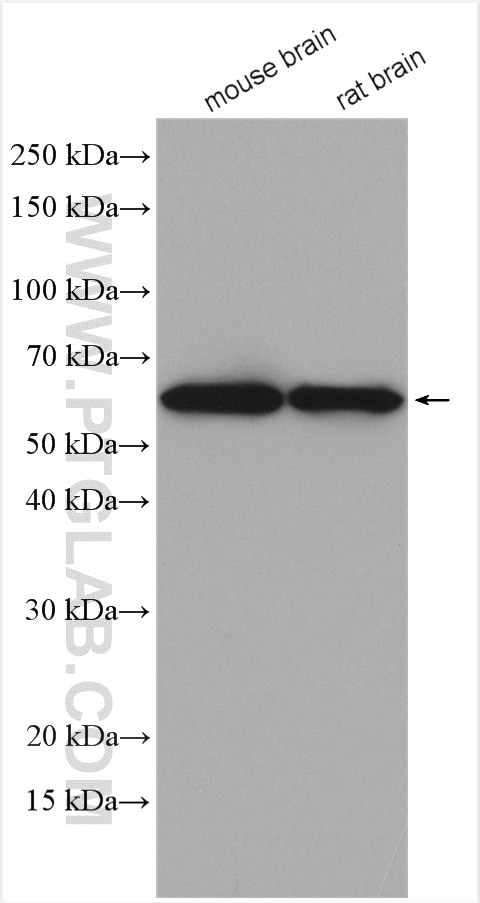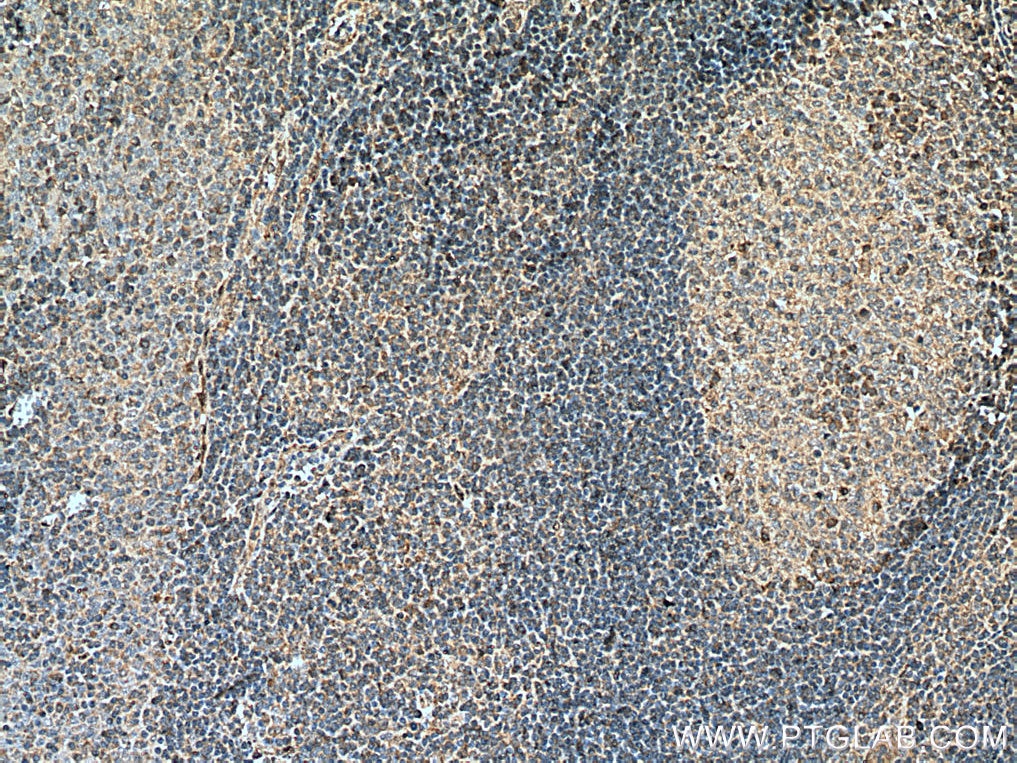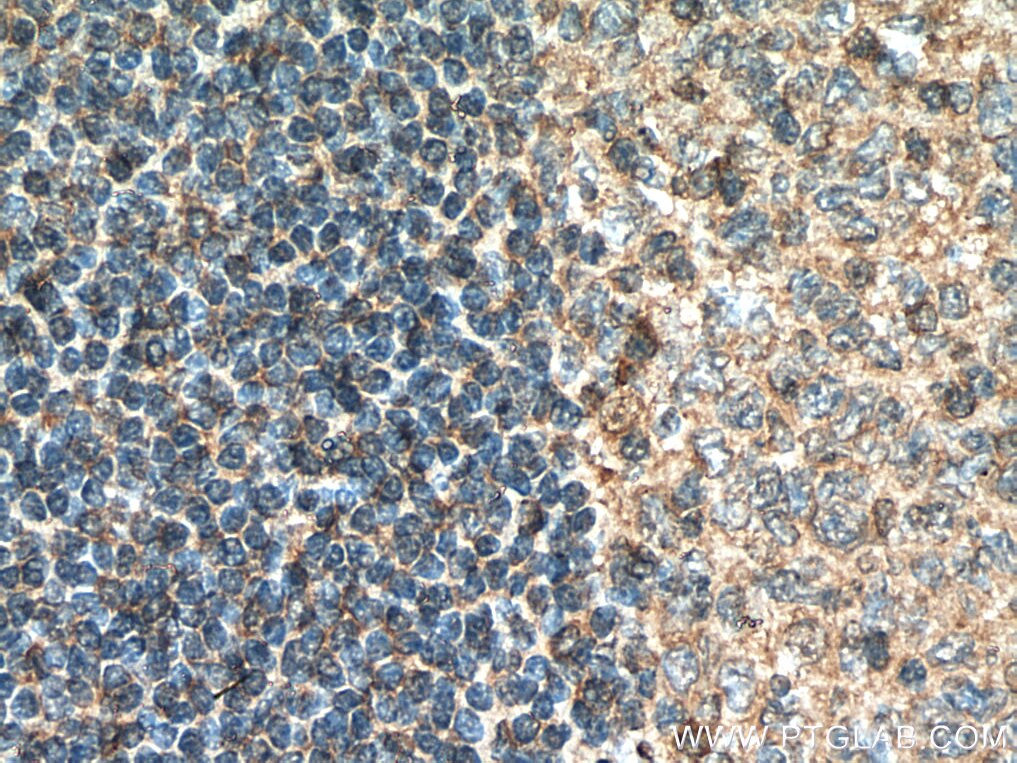Anticorps Polyclonal de lapin anti-AKT3
AKT3 Polyclonal Antibody for WB, IHC, ELISA
Hôte / Isotype
Lapin / IgG
Réactivité testée
Humain, rat, souris
Applications
WB, IHC, ELISA
Conjugaison
Non conjugué
N° de cat : 21641-1-AP
Synonymes
Galerie de données de validation
Applications testées
| Résultats positifs en WB | tissu cérébral de souris, tissu cérébral de rat |
| Résultats positifs en IHC | tissu d'amygdalite humain, il est suggéré de démasquer l'antigène avec un tampon de TE buffer pH 9.0; (*) À défaut, 'le démasquage de l'antigène peut être 'effectué avec un tampon citrate pH 6,0. |
Dilution recommandée
| Application | Dilution |
|---|---|
| Western Blot (WB) | WB : 1:500-1:1000 |
| Immunohistochimie (IHC) | IHC : 1:50-1:500 |
| It is recommended that this reagent should be titrated in each testing system to obtain optimal results. | |
| Sample-dependent, check data in validation data gallery | |
Applications publiées
| WB | See 11 publications below |
| IHC | See 1 publications below |
Informations sur le produit
21641-1-AP cible AKT3 dans les applications de WB, IHC, ELISA et montre une réactivité avec des échantillons Humain, rat, souris
| Réactivité | Humain, rat, souris |
| Réactivité citée | Humain, souris |
| Hôte / Isotype | Lapin / IgG |
| Clonalité | Polyclonal |
| Type | Anticorps |
| Immunogène | AKT3 Protéine recombinante Ag16298 |
| Nom complet | v-akt murine thymoma viral oncogene homolog 3 (protein kinase B, gamma) |
| Masse moléculaire calculée | 465 aa, 54 kDa |
| Poids moléculaire observé | 60 kDa |
| Numéro d’acquisition GenBank | BC121154 |
| Symbole du gène | AKT3 |
| Identification du gène (NCBI) | 10000 |
| Conjugaison | Non conjugué |
| Forme | Liquide |
| Méthode de purification | Purification par affinité contre l'antigène |
| Tampon de stockage | PBS with 0.02% sodium azide and 50% glycerol |
| Conditions de stockage | Stocker à -20°C. Stable pendant un an après l'expédition. L'aliquotage n'est pas nécessaire pour le stockage à -20oC Les 20ul contiennent 0,1% de BSA. |
Informations générales
AKT3, also named as PKBG, is one of 3 closely related serine/threonine-protein kinases (AKT1, AKT2 and AKT3) called the AKT kinase, and which regulate many processes including metabolism, proliferation, cell survival, growth and angiogenesis. AKT3 is a key modulator of several tumors like melanoma, glioma and ovarian cancer. Active AKT3 increases progressively during melanoma tumor progression with highest levels present in advanced-stage metastatic melanomas.
Protocole
| Product Specific Protocols | |
|---|---|
| WB protocol for AKT3 antibody 21641-1-AP | Download protocol |
| IHC protocol for AKT3 antibody 21641-1-AP | Download protocol |
| Standard Protocols | |
|---|---|
| Click here to view our Standard Protocols |
Publications
| Species | Application | Title |
|---|---|---|
Front Oncol Long Non-coding RNA AK025387 Promotes Cell Migration and Invasion of Gastric Cancer. | ||
J Cell Mol Med EGR1 interacts with DNMT3L to inhibit the transcription of miR-195 and plays an anti-apoptotic role in the development of gastric cancer. | ||
Clin Epigenetics Alterations of DNA methylation were associated with the rapid growth of cortisol-producing adrenocortical adenoma during pregnancy. | ||
Cancer Cell Int NEK7 promotes gastric cancer progression as a cell proliferation regulator. | ||
Exp Hematol Oncol YTHDF1 promotes hepatocellular carcinoma progression via activating PI3K/AKT/mTOR signaling pathway and inducing epithelial-mesenchymal transition. |




